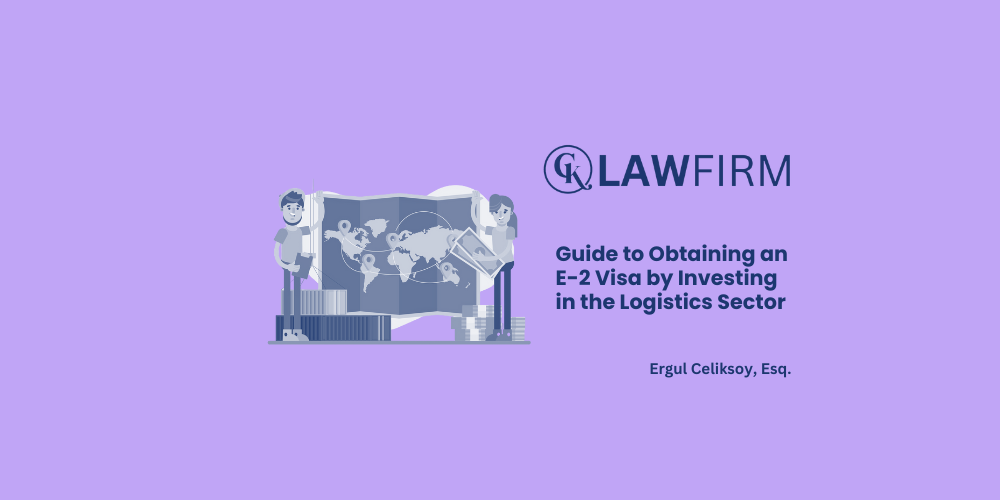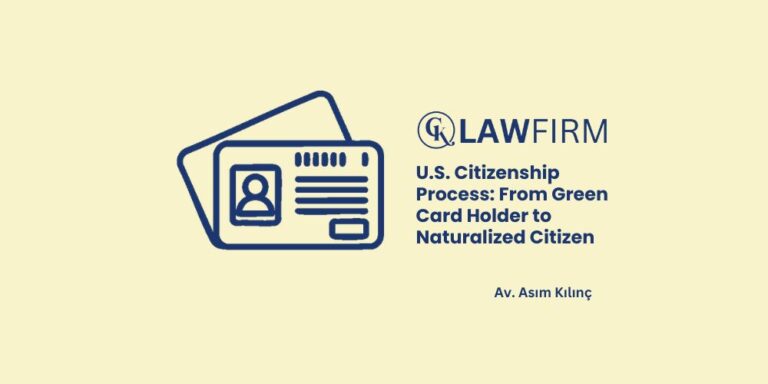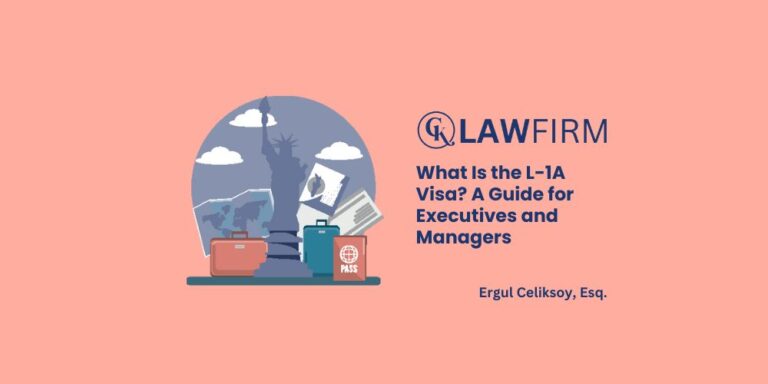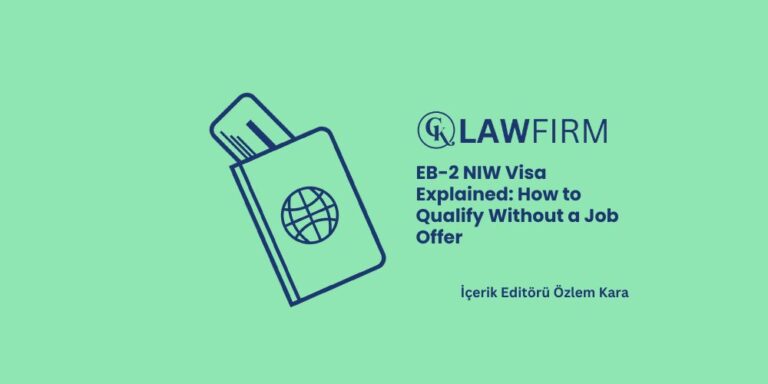Schedule an Appointment with Our Attorneys Now

Guide to Obtaining an E-2 Visa by Investing in the Logistics Sector
Learn how to apply for an E-2 visa by investing in the logistics sector in the U.S. and meet the necessary requirements.
By Ergul Celiksoy, Immigration Attorney at CK Law Firm
The E-2 visa is one of the most advantageous visas available for investors in the United States. This visa allows citizens of countries with a trade agreement with the U.S. to establish or manage a business in the U.S. by making a certain amount of investment. The flexible structure of the E-2 visa offers significant opportunities for those considering investing in the logistics sector. In this article, we will explore the details of the E-2 visa:
- What is the E-2 Visa?
- Why the Logistics Sector?
- What Are the Requirements for Obtaining an E-2 Visa in the Logistics Sector?
- The E-2 Visa Application Process
- Differences Between Applying for an E-2 Visa from Turkey or the U.S.
If you have any other questions related to this topic, feel free to leave a comment at the end of this article, send me a message directly on LinkedIn, or contact me through the website of CK Law Firm, where I am a co-founder!
What is the E-2 Visa?
The E-2 visa is a type of visa available to investors who want to establish or manage a business in the U.S. It requires making an investment that contributes to the U.S. economy with a certain amount of capital. This visa type allows the applicant and their family to live and work in the U.S. However, as a non-immigrant visa, it does not grant permanent residency (Green Card). Nevertheless, as long as the business continues, the E-2 visa can be renewed indefinitely.
Why the Logistics Sector?
The logistics sector in the U.S. is a rapidly growing area offering significant opportunities to investors. At a time when global trade is increasing, e-commerce is accelerating, and supply chains are becoming more complex, investing in the logistics sector can be highly profitable. Logistics not only involves transportation but also includes warehousing, inventory management, shipping, and supply chain optimization. This wide range of services allows investors to enter the sector with different business models.
What Are the Requirements for Obtaining an E-2 Visa in the Logistics Sector?
Investment Amount and Business Model:
The amount of investment in the logistics sector can vary depending on the type of business. Generally, no specific investment amount is required for the E-2 visa. However, the investment is expected to be “substantial.” A minimum investment amount between $100,000 and $200,000 is recommended, depending on the type and scale of the business. The investment must support the sustainable operation of the business and demonstrate profitability potential.Common investment models in the logistics sector include:
- Starting a transportation company
- Establishing warehousing and distribution centers
- Offering supply chain management services
Investment Must Be at Risk:
To obtain an E-2 visa, the investment must be “at risk.” This means the money invested must be tied to the business, and there must be a risk of losing the capital if the business is not successful. This criterion demonstrates the investor’s commitment to developing their business.
Business Sustainability:
The business you establish in the logistics sector must be sustainable. It should not only support the investor and their family but also contribute to the U.S. economy. The business’s potential for growth, job creation, and economic benefit to the U.S. will strengthen the visa application.
The E-2 Visa Application Process
- Eligibility by Nationality: To apply for an E-2 visa, you must be a citizen of a country with a trade agreement with the U.S. Turkey is among the countries eligible to apply for an E-2 visa.
- Business Plan Preparation: Presenting a detailed and realistic business plan is crucial for E-2 visa applications. You must provide a comprehensive business plan showing how your investment in the logistics sector will operate, its goals, profitability projections, and its contribution to the U.S. economy. Your business plan should convince the visa officer of the sustainability and credibility of your business and investment.
- Visa Application and Interview: After preparing the necessary documents, you can apply for the visa through the U.S. Consulate. During the E-2 visa application, an interview is conducted, focusing on the sustainability of your business model and the legitimacy of your investment. It is essential to thoroughly understand your business plan and model before attending the interview.
Differences Between Applying for an E-2 Visa from Turkey or the U.S.
The E-2 investor visa can be applied for both from within the U.S. and from U.S. Consulates abroad. However, there are important differences in terms of process and outcomes depending on where the application is submitted. Understanding these differences can help shape the strategy for investors considering applying from Turkey or the U.S.
Application Location: Consular Application from Turkey vs. Change of Status in the U.S.
From Turkey:
Investors residing in Turkey apply for the E-2 visa through the U.S. Embassy or Consulate. In consular applications, the process is primarily evaluated by consular officers, and if approved, the investor is directly granted the E-2 visa, allowing entry to the U.S. to manage their investment.
Advantages:
- Entry to the U.S.: Once you are granted an E-2 visa from the Consulate, you can enter the U.S. and stay throughout the visa validity period.
- Visa Duration: For Turkish citizens, the visa is typically granted for 5 years and can be renewed.
- Ease of Travel: With the E-2 visa, you can leave the U.S. and re-enter freely during the visa’s validity.
Disadvantages:
- Interview Requirement: A face-to-face interview at the U.S. Consulate is mandatory, which can be a stressful process.
- Initial Investment: A significant portion of the investment must be made before entering the U.S., which can complicate business management.
From the U.S.:
Investors already in the U.S. on a different visa (such as a tourist visa) can apply to change their status to an E-2 visa through the U.S. Citizenship and Immigration Services (USCIS).
Advantages:
- No Interview: In most cases, no interview is required for USCIS applications.
- Staying in the U.S.: Once approved, you can remain in the U.S. and manage your business.
- Starting the Business: Being physically in the U.S. can make it easier to start and manage the business.
Disadvantages:
Travel Restrictions: Changing status does not grant you a visa. If you leave the U.S., your E-2 status ends, and you will need to apply for an E-2 visa at a U.S. Consulate.
No Visa Issuance: The change of status process only provides a legal status change, not a visa. To travel outside the U.S., you will need to obtain a consular visa.
Processing Time:
From Turkey: Consular applications typically result faster, usually taking 2-3 months, depending on the consulate’s workload.
From the U.S.: Applications for status change take longer, usually 4-6 months. However, for an additional fee, premium processing can provide results within 15 days.
Visa Duration and Renewal:
From Turkey: For Turkish citizens, the visa is typically issued for 5 years. As long as the business continues, the visa can be renewed, and the investor and their family can leave and re-enter the U.S.
From the U.S.: A status change to E-2 typically grants a 2-year stay. Before this period ends, you can apply to USCIS for an extension. However, this status does not allow for travel outside the U.S. without first applying for a visa at a U.S. Consulate.
Family Members’ Status:
From Turkey: Family members can apply for an E-2 visa along with the investor. The spouse can apply for work authorization in the U.S., and children can attend school.
From the U.S.: Family members can apply for a status change along with the investor. The spouse can apply for a work permit, and children can continue their education. However, if family members wish to travel outside the U.S., they must obtain a visa from the U.S. Consulate.
Conclusion
Investing in the logistics sector to obtain an E-2 visa presents a significant opportunity for investors aiming to establish a business in the U.S. The size of the investment, the sustainability of the business, and its contribution to the U.S. economy are key factors in the application process. The rapid growth and demand in the logistics sector make investment in this area attractive, while the E-2 visa serves as a supportive tool in this process.
If you are considering investing in the U.S. logistics sector, CK Law Firm can offer you professional support throughout your E-2 visa application process. For professional assistance, detailed information, and consultancy services, feel free to reach out to us at cklawfirm.org, via email at info@cklawfirm.org, or through LinkedIn.
Who is Attorney Ergül Çeliksoy?
Attorney Dr. Ergül Çeliksoy is a founding partner of CK Law Firm and also serves as an Assistant Professor of Law at the University of Nottingham. With extensive experience in U.S. immigration law, Dr. Çeliksoy completed a Master’s degree in international law and human rights law at the University of Nottingham in 2017, followed by a Ph.D. at the same university. His Ph.D., completed in 2022 at the University of Nottingham School of Law, marked a significant milestone in his academic career. Dr. Çeliksoy has published extensively in leading academic journals and is internationally recognized for his expertise in modern slavery, criminal justice, and criminal law. As a member of the California Bar, Dr. Çeliksoy offers exceptional service to his clients, particularly in U.S. immigration law cases. His expertise and experience in immigration law significantly contribute to CK Law Firm’s work in this area.
Dr. Çeliksoy provides comprehensive and strategic solutions to his clients in immigration law cases, helping secure their legal status in the U.S. His work on human rights and immigration processes, particularly in modern slavery and criminal law, effectively addresses the complex legal issues immigrants face. Dr. Çeliksoy reinforces CK Law Firm’s leadership in immigration law by offering reliable and effective legal consulting services to his clients, helping them build new lives in the United States.





